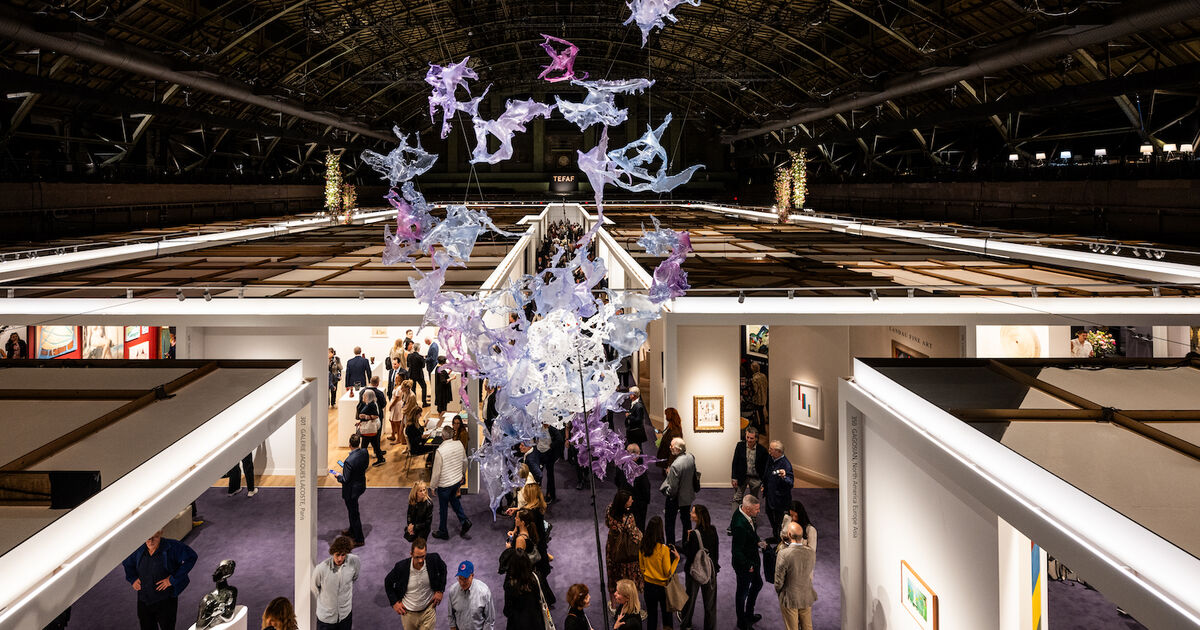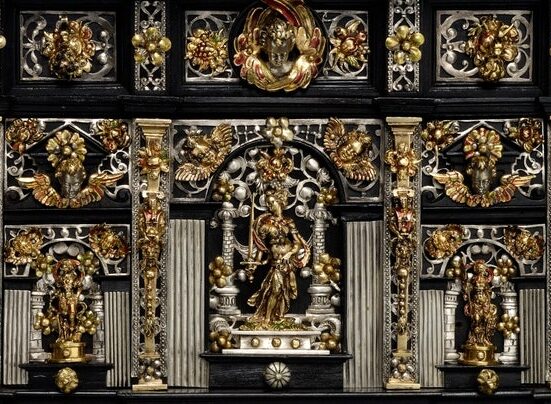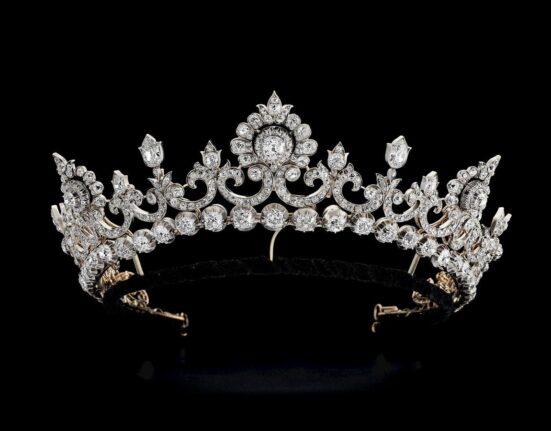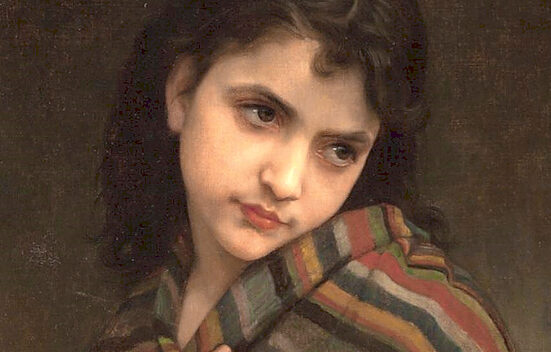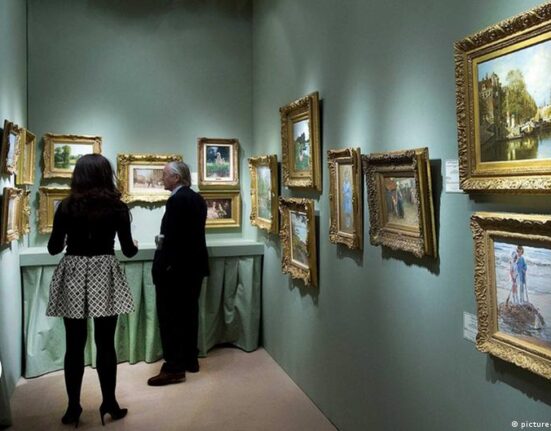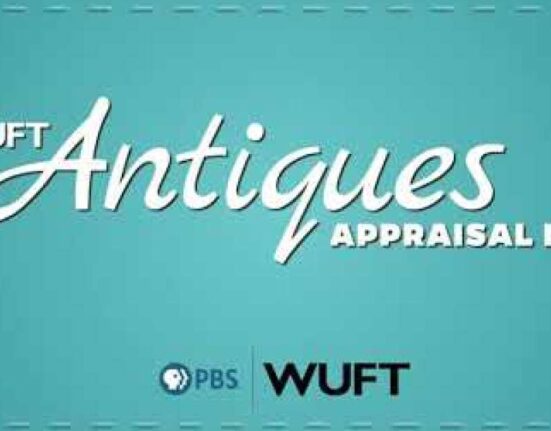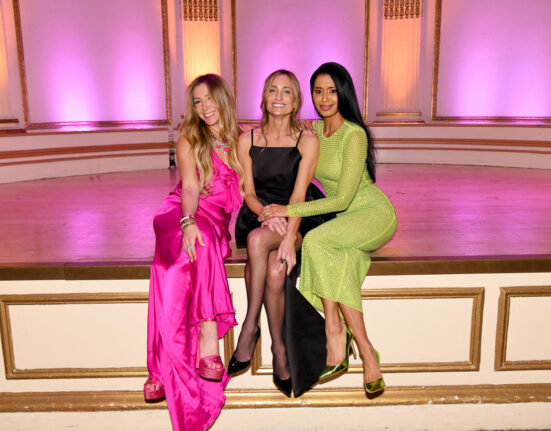Art Market
Arun Kakar
Interior view of TEFAF New York, 2024. Photo by Jitske Nap. Courtesy of TEFAF.
There might have been as many art fairs in New York this past fortnight as rainy days, but on an overcast Thursday afternoon, VIPs at The European Fine Art Fair (TEFAF) were showing no signs of dreariness. Copious amounts of champagne and oysters—a TEFAF hallmark—may have helped to assuage fair-tigue, but it’s the fair’s aesthetic offerings that are known to enliven spirits. And this 10th edition of the New York fair did not disappoint.
Taking place through May 14th, TEFAF New York brings a vibrant display of art, jewelry, antiques, and design to the Park Avenue Armory, a grand venue befitting of the fair’s suited-and-booted sensibility. Amid aisles and junctions adorned with opulent floral displays (the flowers are real, bring your anti-allergens), selfies and handshakes were in full bloom mere minutes into the fair’s opening day, which included Leonardo DiCaprio, Mark Ronson, Anderson Cooper, KAWS, Martha Stewart, and David Geffen among its notable attendees.
The artwork here skews more modern and contemporary than the fair’s Old Master–heavy home turf of Maastricht (which took place two months ago). However, TEFAF New York shares its European counterpart’s ability to showcase breadth, depth, and discoveries that cut cohesively across generations, while hosting less than half the number of exhibitors (89 galleries are taking part in New York this year). And at a time in the art market when galleries are more inclined to play it safe with their art fair strategies, TEFAF offers a welcome assurance of quality, where blue-chip stalwarts can rub shoulders with lesser-known gems and even the odd ultra-contemporary name.
Installation view of Ben Brown Fine Arts’s booth at TEFAF New York, 2024. Courtesy of Ben Brown Fine Arts.
“TEFAF is a fair that covers a lot of ground, from jewelry and Old Masters up to 2024 paintings, and as such, we’ve got a bit more range than we usually would,” said Hugo Cobb, head of sales at Ben Brown Fine Arts. The London gallery is showing standout works by a list of artists that reads almost like a bingo card of 20th-century art—including Alighiero Boetti, Lucio Fontana, Lucian Freud, Alberto Giacometti, Agnes Martin, Ed Ruscha, and Andy Warhol, among others.
The booth’s standout work is an “unbelievably rare” 1930 Lyonel Feininger painting, Rathaus Treptow an der Rega, a prime example of the artist’s use of soft colors and unique brand of Expressionism. This marks its first public appearance in more than 30 years. Showing it at TEFAF, Cobb noted, is ideal. “This is a fair where you can bring something like this, and feel totally relaxed that people will understand the importance, the quality and respond to it,” he said.
Installation view of Mazzoleni’s booth at TEFAF New York, 2024. Photo by Daniel Terna. Courtesy of Mazzoleni.
Those with the most wide-ranging booths tend to bring their strongest examples. At Torino gallery Mazzoleni’s booth, the likes of Fontana, Boetti, Salvo, and Alberto Burri showcase the gallery’s strength in post-war Italian art, while a large-scale Alex Katz painting stands as a nod to the local crows. While Boetti’s Aerei (1978), priced at $300,000–$350,000, and Burri’s Bianco Plastica (1965), priced at $1.5 million, are not to be missed, the work drawing the most attention at the booth is Salvo’s La Valle (2006), priced at $450,000. The imaginative landscape is rendered in the late in-demand artist’s trademark serenity. “For us, it’s not something new because it’s been in our collection for decades and we used to work with him directly in the early ’90s,” said Luigi Mazzoleni, the gallery’s director. “We’re happy to see that the market [for Salvo] is global.”
While six- and seven-figure works are commonplace at the fair—as is typical of TEFAF—gallerists are keen to emphasize the precedence of quality over price point. Known for its strict vetting and admissions process for would-be exhibitors, the fair has long prided itself on a reputation of being your favorite art dealer’s favorite art fair. With their almost academically serious approach to presentations, exhibitors, it seems, are out to impress their colleagues as much as their collectors.
“We have works here [priced] from $4,000 to $4 million,” said Leon Tovar, founder of his eponymous New York gallery. “If the quality is there, we bring it—the collectors that come to TEFAF are super qualified.” The gallery’s booth is anchored by one of the more stunning works at the fair, Rufino Tamayo’s Claustrofobia (1954). The painting captures an anguished, ambiguous crimson figure, trapped in the confines of an even more ambiguous enclosure, painted with a vivacity that makes it easy to see why the artist is said to have influenced the likes of Francis Bacon. The gallery also presents a wall of outstanding geometric and spiral works on paper by Emma Reyes, whose work is currently included in the main show at this year’s Venice Biennale.
Reyes is among several mid-career and late female artists who are the subject of curated booth selections at this year’s fair. At Sprüth Magers, Jenny Holzer, Barbara Kruger, and Rosemarie Trockel—all of whom have shown with the gallery since the 1980s—are the subject of a three-artist presentation; while London gallery Offer Waterman is showing the elegant works of leading women ceramicists Lucie Rie, Magdalene Odundo, and Jennifer Lee. All three artists, each considered among the most influential ceramists of their generations, are receiving increased recognition among collectors, with Rie (who passed away in 1995) setting a new auction record this past November.
“We’ve found the interest in ceramics in the last couple of years has been phenomenal [and is] really growing,” said Robin Cawdron-Stewart, senior director at the gallery. Offer Waterman’s September show in London, “On Foot,” curated by fashion designer Jonathan Anderson (who was present at the fair), featured a series of ceramic works that were met with a positive response, Cawdron-Stewart noted. Prices for works in the booth range from $15,000 to $425,000—“something for everyone—they’re very accessible,” he added.
At Thaddaeus Ropac, American abstractionist Joan Snyder is the subject of a captivating solo presentation spanning her 60-year practice, which follows the gallery announcing its representation of the artist earlier this year. On opening day, eight works sold, including the vivid 2001 diptych Primary Fields, which sold for $350,000 to an institution in Asia; the mixed-media WallGarden (2015) for $160,000; and works on paper priced at $15,000–$40,000 apiece.
Joan Snyder, Primary Fields, 2001. © Joan Snyder. Courtesy of Thaddaeus Ropac.
“Sales have been swift as a result of the extremely enthusiastic response,” said founder Ropac. “[Snyder’s] important contribution to the field of American abstraction from the 1970s onwards is new to a number of collectors we’ve seen here, and to those who are familiar with her paintings, the presentation of her works on paper is providing greater insight into her practice and proving to be a real draw.”
Another artist receiving newfound interest is Rebecca Salsbury James, whose works are exhibited alongside sculptures by David Wiseman at New York gallery Salon 94’s booth. A friend and contemporary of Georgia O’Keeffe, James was a model and muse to Alfred Stieglitz and married to the photographer Paul Strand, but her work has long been overlooked. In a series of precise works painted on glass pane, subjects from delicate still lives to exacting wildlife compositions will be a new, refreshing encounter for many visitors.
Rebecca Salsbury James and David Wiseman, installation view of Salon 94’s booth at TEFAF New York, 2024. Courtesy of the artists and Salon 94.
“Her idea of modernism was defined by looking into the past, at folk art and art made by women, so this was her way of making modern paintings,” explained Salon 94 founder Jeanne Greenberg Rohatyn. The choice to show the works at the fair—priced in the range of $300,000 to $850,000—was intuitive. “We invest a lot of our intellectual capital in putting together a collection of work and telling a cohesive story and sharing it with this New York audience because of course, it’s a very sophisticated one…it’s really important for us to do an exhibition like this at a place like TEFAF,” Greenberg Rohatyn added.
Another strength of the fair is that discoveries aren’t limited to unfamiliar names. Such is the case with Virgil Abloh’s throne-like Tower Hills (2021), on view at Galerie Kreo’s booth. The bronze sculpture, priced at $60,000 (one of a limited edition of eight), playfully mimics the layered texture of Oriented Strand Board, the wood used in packaging crates, and is among the last produced by the multihyphenate talent, who passed away in 2021. “It’s important to have Virgil in the booth and have one of the major pieces that really embodies his work, being both super graphic in a sense and at the same time, super sophisticated in the way it’s done,” said Clemence Krzenrtowski, the gallery’s founder.
First-time exhibitor Venus Over Manhattan is also presenting rare works by esteemed artists, making its TEFAF debut in one of the fair’s more gallery-like Historical Rooms. “For somebody like our gallery [that’s] so well known for doing art historical projects that kind of reinvent artists’ careers and recontextualize [them], TEFAF feels like a natural fit,” said gallery partner Anna Christina Furney. Visitors are greeted by Robert Colescott’s hulking, vividly brilliant, satirically tinged Tobacco: The Holdouts (1987), the centerpiece of a room that feels like a smartly hung group presentation. Works by the likes of Joan Brown and Richard Mayhew are also among the highlights.
Elsewhere in the Historical Rooms, fellow debutant The Page Gallery has also chosen TEFAF to reach new audiences. The Seoul-based gallery has put together a solo presentation of Choi Myoung Young—a leading name in the Dansaekhwa movement that originated in post-war South Korea—that covers works from the 1970s onwards, demonstrating the artist’s precision, process, and discipline. “We want to expose his great career as well as actually expose the gallery,” said gallery director Heejin No. “It’s a good marriage [and] we’ve been very serious about presenting in this historical part of New York.” Paintings at the booth range in price from $30,000 to $150,000, with works on paper priced from $3,000 to $15,000.
Myoung Young Choi, Sign of Equality 75 – 20, 1975. Courtesy of the Page Gallery.
As VIP day was getting underway, it was clear that new audiences were in abundant supply, and early sales on the VIP day of the fair confirmed that the strong attendance was met with concrete transactions. Among those reported were a Pablo Picasso painting for a price in the range of $1.8 million–$2 million at Almine Rech; a £625,000 ($782,310) Anish Kapoor sculpture at Lisson Gallery; an Etel Adnan painting for “around” $200,000 at MASSIMODECARLO; and a $100,000 Kehinde Wiley painting at Sean Kelly Gallery. If the mood of the opening day was anything to go by, there will be plenty more to come.
Arun Kakar
Arun Kakar is Artsy’s Art Market Editor.

